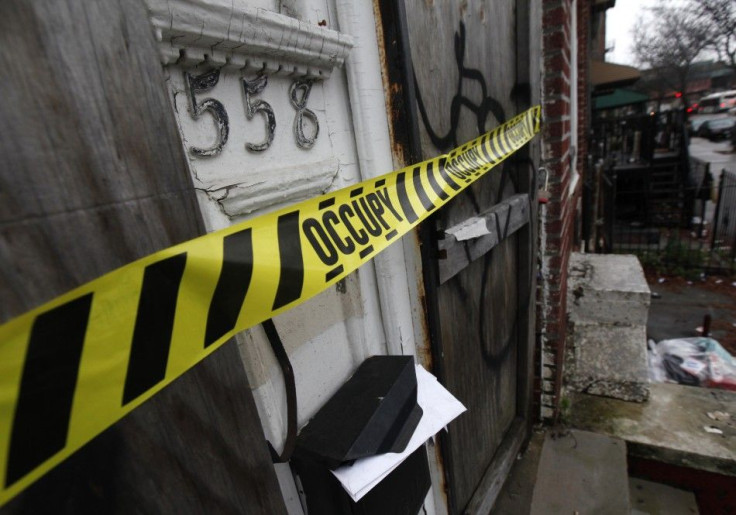Occupy Wall Street Turns to Foreclosure, Eviction Defense

Alfredo Carrasquillo got a resounding welcome when he and his family moved into their new home on Tuesday. Hundreds of people stood in a steady drizzle to celebrate and listen to speeches from a procession of community figures, activists and elected officials.
Carrasquillo could soon be evicted, but that did not seem to diminish anyone's enthusiasm. The house was one of many vacant properties in the chronically impoverished Brooklyn neighborhood of East New York, which has been hollowed out by a soaring foreclosure rate five times that of New York state, and community organizations allied with Occupy Wall Street helped Carrasquillo and his family move in as part of a national day of action targeting foreclosures.
Under the gaze of police officers stationed on a nearby rooftop, a minister named Patricia Malcolm addressed the fact that Carrasquillo's homecoming could be short-lived.
Somebody told me that this is illegal, she said. But let me ask you a question: how legal was it to take us out of our homes?
Civil Disobedience Preventing Eviction - a Powerful Tactic?
As the country continues to grapple with the devastating aftermath of the housing market's collapse -- Michelle Meyer, an analyst for Bank of America, estimated to Business Insider that another eight million homes could go into foreclosure in the next four years, which would bring the total since 2007 to 14 million -- acts of civil disobedience centering on foreclosures and evictions represent a powerful tactic for the Occupy Wall Street movement.
Today is the beginning of a new phase in the Occupy movement, a protester told a group en route to Tuesday's action. Today we're shifting to reclaiming our public spaces, to reclaiming our homes from the corporations that have taken them from us.
There is a rich precedent for housing-related activism, including a group of squatters that occupied abandoned buildings on New York City's Lower East Side. But it has taken on new resonance against the backdrop of a financial crash spurred by predatory lending and unscrupulous mortgage securitization, as well as revelations of widespread fraud in foreclosure processing that has left many Americans homeless.
It's literally uncountable the number of organizations that are interested in engaging in this tactic, said Max Rameau, whose organization, Take Back the Land, places people in foreclosed and government owned homes. I think over next spring you're going to see this kind of movement happen all over the United States in mass numbers. If Take Back the Land created the model, the occupy movement has given it the energy and then numbers and the mass.
Occupy Wall Street Goal: Agitation and Consciousness Raising
The purpose is not to find permanent homes for the families who move into foreclosed properties, Rameau said. As with Carrasquillo's well attended homecoming, which also drew ample media coverage, the goal is to generate awareness and put pressure on the lenders foreclosing on houses and law enforcement tasked with evicting residents.
We're intentionally breaking the law in order to have this kind of confrontation, Rameau said. We have to mobilize enough people and enough media in front of the house so that it gives the police pause and makes them think ok, is it really worth creating another empty house in this neighborhood full of empty houses?
Take Back the Land's Rochester offshoot has had great success with the tactic. When police attempted to evict a Rochester woman named Catherine Lennon they organized a nonviolent resistance, leading the police to deploy a SWAT team. Lennon returned to her house and was granted a hearing to examine her contention that her foreclosure had been improperly processed. Her hearing was indefinitely postponed after the attorney representing Bank of America, Steven J. Baum, shuttered his law firm amidst an investigation by the New York Attorney general into the types of practices Lennon was alleging.
This crisis is coming to a level of absurdity where they're not doing something as simple as the paperwork and yet they're taking peoples' homes, said Ryan Acuff, a member of Take Back the Land Rochester. Our feeling is a lot of injustice and fraud is going on, if we can shine a light on the individual stories and cases and practices of the banks then they're going to change those practices.
By rallying community support for people facing eviction, Acuff said the organization seeks to iluminate the idea of housing as a human right, not just a commodity that fluctuates with the market.
We want to do these on a scale where we pressure the banks and local governments to reprioritize this issue of homes for people so it's not just about profit or numbers on a spreadsheet, Acuff said. This is not just an issue of mortgages or technicalities of the law, this is a basic moral issue.
© Copyright IBTimes 2024. All rights reserved.





















